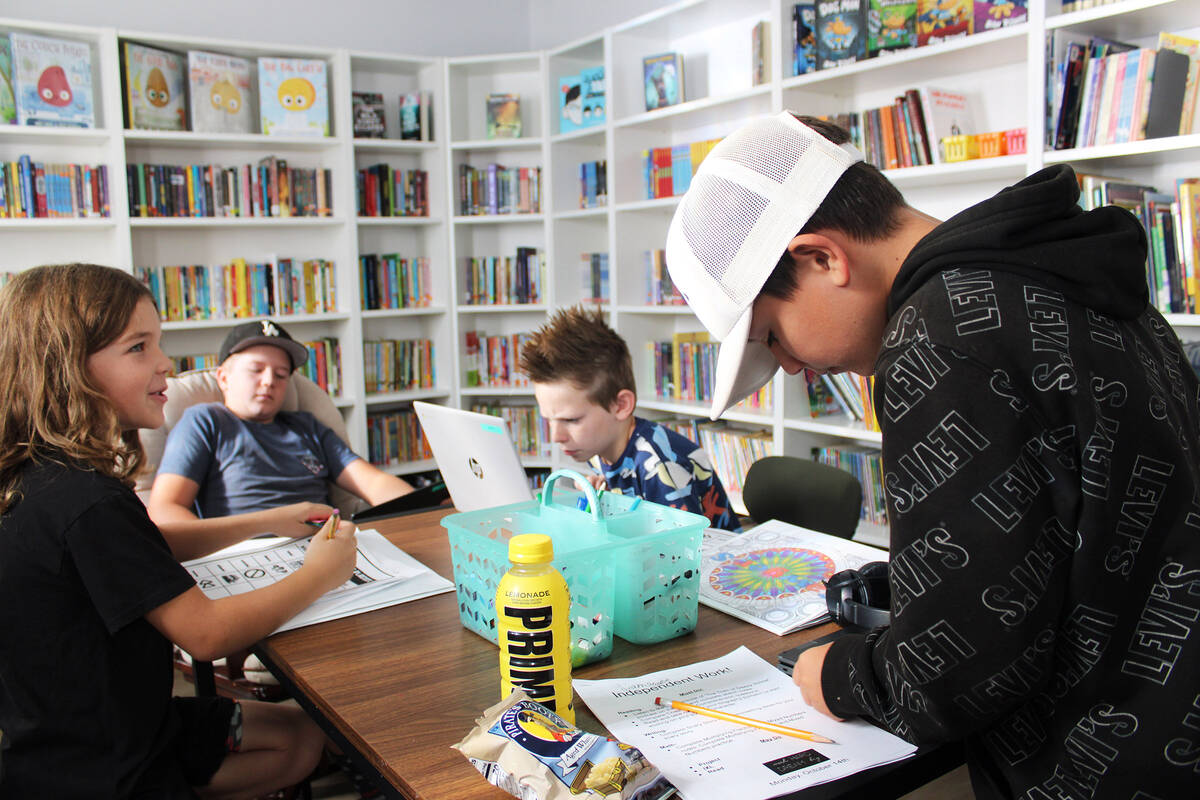
Something new recently opened in Boulder City, which brought with it a bit of a twist to traditional education.
In early August, EmpowerEd Leaders opened its doors to children in kindergarten through eighth grade at 1028 Wyoming St.
Founders Jayme Haines and Amy Higley, both former teachers at Andrew J. Mitchell Elementary, said they were excited to bring the microschool concept to the town in which both grew up.
“As being a parent and a public-school teacher, there weren’t many options,” Haines said. “As wonderful as the staff is at our schools, the district is just making choices that I don’t feel supports the kids as much as they could. The decisions I felt were best for the kids were being pushed aside by the district.”
Higley agreed.
“We wanted to find an alternative way to educate children that best works for families and the kids,” she said.
EmpowerEd Leaders has 36 children and already has a waiting list. Of those, nearly half came from public or private schools and the rest were homeschooled. What’s even more unique is that they attend from 8:30 a.m. to 12:30 p.m. Monday-Thursday. Fridays are set aside for field trips and special projects as well as tutoring.
In each of the rooms at their current location, you will find kids broken into various class groupings as well as other rooms dedicated to crafts, computers and a library. While Haines, Higley and a teacher’s aide work with the children, there is also a lot of independent study. They said microschools can come in a variety of forms such as private schools, charter schools, tutoring centers or homeschool co-ops.
“We’ve been thinking about this for a couple of years,” Higley said. “But it really started to come into play this past spring.”
When asked how much of an undertaking it’s been starting from scratch, they both laughed.
“It was a lot of looking and hoping something would come up,” Higley said. “We lucked out in that everything kind of fell into place. We were able to become part of a non-profit group that has helped fund the renovation of this space.”
“We wanted a space to feel safe for families and for them to trust us with their children to help them learn in the best possible environment,” Haines added.
Through social media and word of mouth this past school year, it quickly spread as to what they were doing. They also hosted an open house, which drew lots of interest among the parents. And since both worked at Mitchell, some of the parents and students were familiar with the duo. Add to the fact they were both born and raised in Boulder City, they know both the community and its residents. That said, they concurred it was a leap of faith both by them and the parents when starting something brand new.
“It’s all worked out the way we had hoped,” Haines said. “It’s been a lot of work but it’s been worth it.”
Despite the school day being just four hours, the two said that is still plenty of time for the kids to learn what they need. It then frees up more time at home with their families or other activities or sports.
“It’s not a challenge to get everything done in that amount of time,” Higley said. “By the last hour of the day, they’re pretty much finishing things up and working on other projects.”
For the parents of the kids there, they said many still like the homeschool feel but it also allows them to be more social with kids their age. It also came down to school safety and content of what is being taught.
“We decided that if we didn’t do this now (in Boulder City) someone else would,” Haines said. “So, we went for it. We want to thank the parents who also took a leap of faith. Without them we could not have done this.”
So how did microschools become a thing? According to a 2022 article on edchoice.org, while not necessarily a new concept, it gained in popularity during and following the pandemic.
“The last two years of rolling school closures have pushed families to think differently about K-12 education,” it states. “How schools responded to the pandemic that the traditional, one-size-fits-all model of the public school system does not work for everyone. The pandemic magnified these challenges and warmed people to the idea that families need a range of different educational models to properly meet all of their children’s needs.”
It went on to state, “Microschools, sometimes referred to as learning pods, is the re-imagining of the one-room schoolhouse, where class sizes are usually fewer than 15 students of varying ages, and the schedule and curriculum is tailored to fit the needs of each class.”
Ron Eland is editor of the Boulder City Review. He can be reached at reland@bouldercityreview.com or at 702-586-9523.